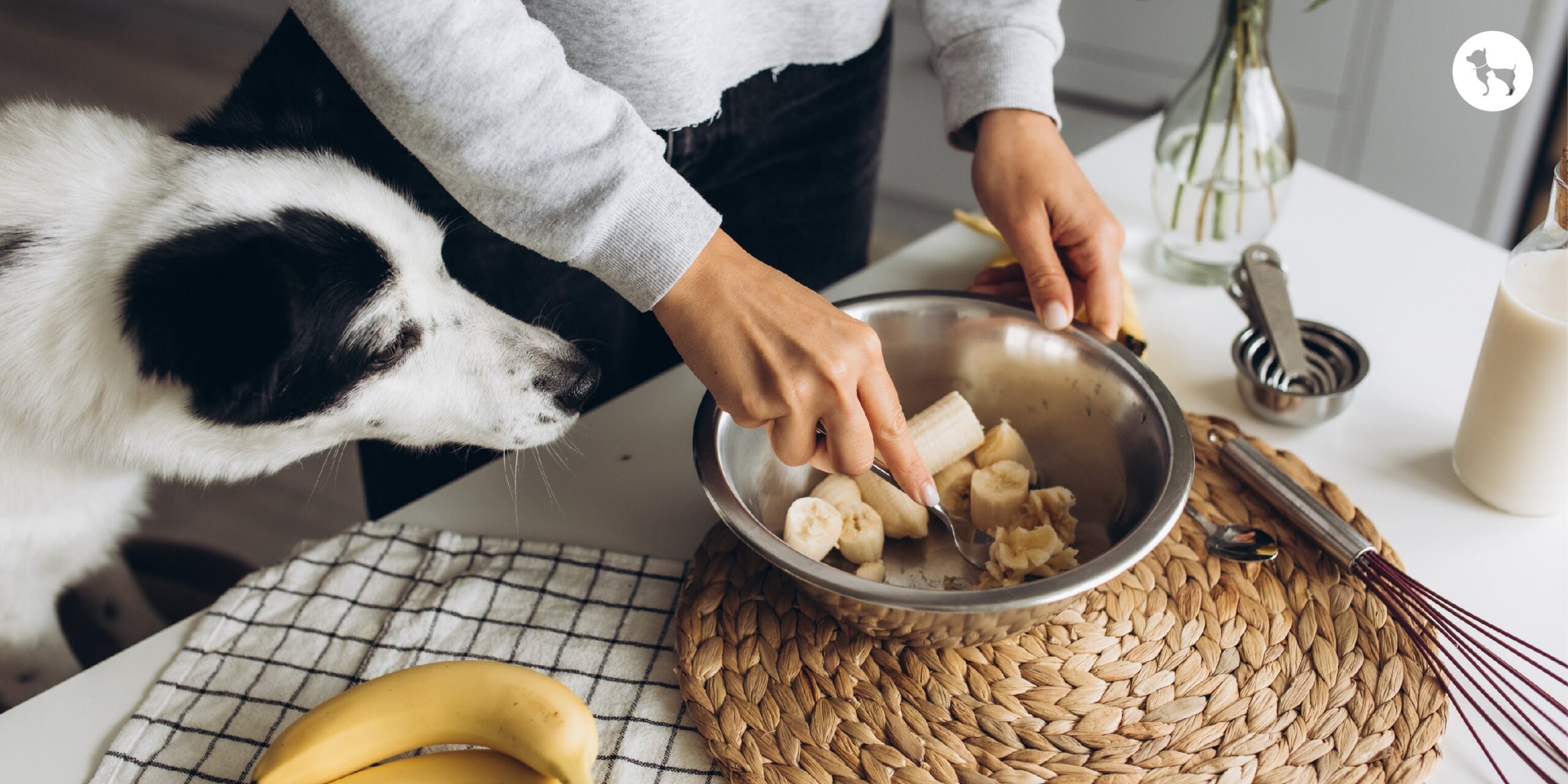
Bananas are often seen as a healthy snack for humans, but many pet owners may not realize that this tropical fruit can offer a surprising range of benefits for their canine companions as well. Bananas are rich in nutrients and can serve as a safe, tasty, and occasionally beneficial addition to your dog’s diet, but like anything, moderation is key. In this article, we’ll explore the nutritional benefits of bananas for dogs, potential risks, and practical tips on how to incorporate them into your pet’s diet.

Nutritional Benefits of Bananas for Dogs
Bananas are a nutrient-dense fruit, packed with essential vitamins, minerals, and fiber that can contribute to your dog’s overall health. Here’s a breakdown of the key nutrients found in bananas and how they can benefit your dog:
1. Potassium
Potassium is vital for maintaining proper muscle function and nerve transmission. For dogs, adequate potassium intake helps maintain heart health and regulate fluid balance. Dogs with conditions such as kidney disease or heart issues may benefit from the potassium content in bananas, but always consult with a vet before introducing any new foods if your dog has health problems.
2. Fiber
Bananas are a good source of fiber, which can help promote healthy digestion. Fiber helps regulate bowel movements and prevent constipation, making bananas a helpful addition to a dog’s diet if they suffer from digestive issues. It also supports healthy gut flora, contributing to better overall digestion and nutrient absorption.
3. Vitamins (B6 and Vitamin C)
- Vitamin B6 is essential for healthy brain function, nerve health, and red blood cell production. It also helps in the synthesis of serotonin, which can contribute to mood regulation and stress relief. Bananas are an excellent source of vitamin B6, which can support your dog’s cognitive function and emotional well-being.
- Vitamin C plays a role in supporting the immune system, promoting healthy skin, and helping the body fight off infections. While dogs can produce their own vitamin C, additional intake through food like bananas can be beneficial, especially for older dogs or those with weakened immune systems.
4. Manganese
Bananas also contain manganese, an essential mineral that helps with the formation of connective tissue, bone health, and enzyme activation. Manganese supports the body’s ability to metabolize proteins, fats, and carbohydrates, which is crucial for your dog’s overall health.
5. Magnesium
Magnesium is necessary for proper muscle function, bone health, and nerve transmission. Like potassium, it helps maintain electrolyte balance in your dog’s body. The magnesium content in bananas can be a great way to support your dog’s muscular and skeletal health.
How Bananas Can Benefit Your Dog’s Health
Aside from the general health benefits provided by the nutrients found in bananas, here are a few specific ways that bananas can positively affect your dog’s well-being:
1. Digestive Health
Bananas are rich in fiber, which can help regulate your dog’s digestive system. Whether your dog struggles with diarrhea or constipation, the fiber content in bananas may help normalize bowel movements and provide gentle relief. The high levels of soluble fiber in bananas can also aid in maintaining a healthy balance of gut bacteria.
2. Energy Boost
Bananas are a great natural source of carbohydrates, primarily in the form of natural sugars (fructose). These sugars provide a quick energy boost that’s ideal for active dogs. Whether your dog is a high-energy breed, an athlete, or enjoys long walks, bananas can give them a natural pick-me-up after exercise.
3. Weight Management
For overweight dogs, bananas can be a great low-calorie snack when served in moderation. They provide a sense of fullness due to their fiber content, reducing the urge for excessive eating. The fruit can also be a healthy alternative to high-fat, high-calorie dog treats.
4. Heart Health
Potassium is an essential mineral for heart health, and bananas are rich in potassium. For dogs with heart conditions, moderate amounts of bananas may help regulate blood pressure and maintain heart function. However, always check with your vet before offering bananas to dogs with specific heart issues, as they may require a specialized diet.
5. Dental Health
While bananas are not a substitute for regular brushing, their texture can help remove some plaque buildup on your dog’s teeth. Offering banana slices or using mashed bananas in dog-friendly recipes may provide some added oral hygiene benefits.
6. Improved Mood and Anxiety Relief
Vitamin B6 found in bananas helps with the production of serotonin, the “feel-good” neurotransmitter. This can have a calming effect on your dog, potentially helping to reduce anxiety, fear, or stress, especially during stressful situations like thunderstorms, fireworks, or vet visits.
How to Safely Serve Bananas to Your Dog
While bananas can be a healthy addition to your dog’s diet, it’s important to feed them in the right way. Here are some helpful tips for serving bananas to your dog:
- Peel and Slice: Always peel the banana before serving it to your dog. The peel can be difficult for dogs to digest and may cause choking or digestive issues. Slice the banana into small, bite-sized pieces to make it easier for your dog to eat and prevent choking.
- Moderation is Key: Bananas are naturally high in sugar, which can lead to weight gain or digestive upset if consumed in excess. Treat bananas as an occasional snack rather than a daily food. A few slices of banana a few times a week should be enough for most dogs.
- Use as a Topping or Treat: You can mash a banana and mix it with your dog’s regular food or use it as a topping for dry kibble. You can also freeze banana slices or blend them into dog-friendly smoothies for a refreshing treat.
- Consider Allergies: While rare, some dogs may have an allergic reaction to bananas. If it’s your dog’s first time having banana, start with a small piece and observe for any signs of allergy, such as vomiting, diarrhea, or itching. If any symptoms occur, discontinue feeding bananas and consult your vet.
READ ALSO: When to Use Metronidazole for Dogs
FAQs
Can I give my dog a whole banana?
It’s best to slice the banana into small, manageable pieces to reduce the risk of choking, especially for smaller dogs.
How much banana can I feed my dog?
A small slice or two is sufficient for a treat, depending on your dog’s size. Generally, treats should make up no more than 10% of your dog’s daily caloric intake.
Can bananas cause diarrhea in dogs?
While bananas are generally easy on a dog’s stomach, too much fiber from the fruit may cause digestive upset or diarrhea in some dogs. Always introduce new foods gradually.
Are frozen bananas safe for dogs?
Yes! Frozen banana slices can make a refreshing and healthy treat, especially on hot days. Just ensure they are sliced small enough to avoid choking.
Can puppies eat bananas?
Yes, puppies can eat bananas in moderation. However, since their digestive systems are still developing, start with small amounts and watch for any signs of an upset stomach.
Leave a Reply
You must be logged in to post a comment.